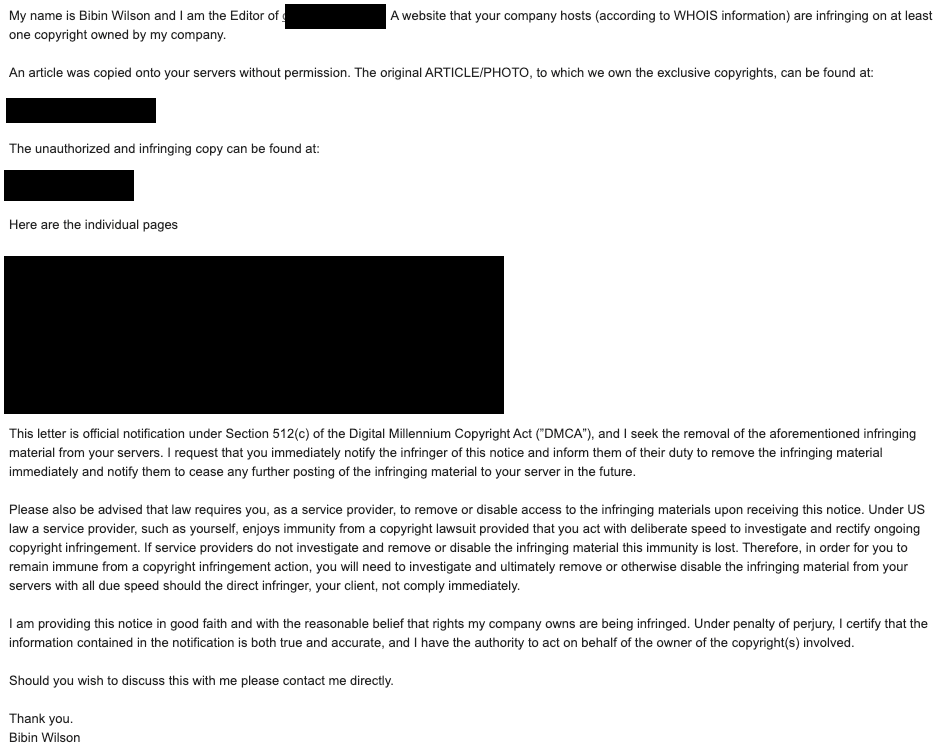When it comes to blogging, there will always be people stealing your content and publishing it without your permission.
I have dealt with this problem multiple times. The worst part is they copy your content word by word without even trying to make some changes.
In this blog, I will talk about the following.
- Plagiarism affecting google rankings.
- Contacting the person who plagiarised your blog content.
- Finding the hosting provider.
- Drafting & Sending DMCA notice to the hosting provider.
How Plagiarism Affects Google Rankings
After reading google webmaster guidelines, I was under the impression that if someone copies your content and publishes it, it won't affect your ranking as google knows the information about the original content. However, it affects the sites who are doing the Plagiarism.
Here is what google says about plagiarized content.
In the rare cases in which Google perceives that duplicate content may be shown with the intent to manipulate our rankings and deceive our users, we'll also make appropriate adjustments in the indexing and ranking of the sites involved. As a result, the ranking of the site may suffer, or the site might be removed entirely from the Google index, in which case it will no longer appear in search results.
But it is not entirely correct. In rare cases, the plagiarized content may rank higher than your original content and it happened to one of my blogs.
I noticed a drop in search traffic for one of the top-ranking blog posts. When I searched the keyword that I was ranking, I found a medium blog post that was the exact copy of my top blog ranking.
In another instance, a blog was publishing the same content I was publishing (copied word by word with the typos :D). I came to know about it when one Reddit user sent me an email saying that someone plagiarized my content. Thanks to him. Also, I thanked him with Reddit coins 💰.
The worst part was the plagarized content was ranking above my content in google. I am not sure how the algorithm pushed the plagarized content to the top, perhaps because he published the same content on the same day.
How to Contact the Person Who Plagiarised Your Blog
The first step in dealing with plagiarism is to contact the blog owner and politely ask him to remove the content from his blog.
You can find the contact details of the blog owner through the following pages
- Contact Us
- About us
- Author Bio
- Privacy policy
- Disclaimer
Most of the blogs will have a "contact us" page with the contact form. You can send a message to remove the plagiarised content through the contact form.
If you don't find a contact page, check the About us page and see if there is any email mentioned.
You can also check the individual post and see if there is any author info.
Finding the Hosting Provider
If the blog owner doesn't respond, you can take it to the hosting provider who hosts the plagiarised content.
There many websites which will give you the information of the WebHost if you type in the domain name.
For example,
Sometimes, websites use Cloudflare as their CDN, and you might not get the actual hosting provider details. In this case, you can forward all the details to Cloudflare and send the details to the respective host.
DMCA Takedown Notice
DMCA (Digital Millennium Copyright Act Services) is an online service that primarily deals with copyrights.
You can use a DMCA takedown notice template and send it to the hosting provider to remove the content. You will get the DMCA notice template online.
Here is the screenshot of an email I have sent to the hosting provider to take down the plagarized page.
Note: Open the image in the new tab to view it clearly

The hosting company has taken down the website the very next day.
If the website owner proves that the content is not plagarized, he can send a counter request and bring back the website without removing the content.
Conclusion
Plagiarism is something that will never stop.
If your blog has huge traffic, It becomes impossible to hunt down blogs and websites that copy your content.
However, if you find a plagiarised content doing damage to your blog or credibility, you can always remove the content from the respective blog with a DMCA notice.
![How to Deal With Someone Copying Your Blog Content [Plagiarism] Feature Image](/content/images/size/w1200/format/avif/2026/01/blog-plaragism.jpg)



